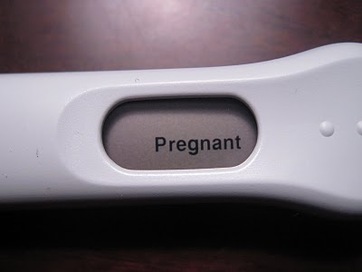I have experienced much pain in my days on earth. Illness, disease, deep depression, persecution, hatred, scorn and torment. But no pain that had come before or since can compare with October 20, 2009.
Several weeks prior, I met Kristin for lunch at the Red Robins in Valencia. After we ordered (I had a teriyaki burger with pineapple) my wife handed me a tube wrapped in Christmas paper.
I smiled.
I knew what it was. “This is a pregnancy test isn’t it?” To this day she still has a hard time surprising me.
We’d been trying to get pregnant for only a short while, and in that moment, as I pulled out the digital test and read the word “pregnant” I was a father.
I was also a health-code violator because I was waving around a tainted instrument in the middle of an eating establishment . . . but no one seemed to care.
The next few weeks were a flurry of events. Doctor’s appointments, early pregnancy classes, decisions about moving to a new home, vitamins, boys names (I liked Hrothgar), girl’s names, excitement, energy, and exuberance!
Then Tuesday came. It was a bright and sunny California day. I spent the morning in our one bedroom apartment studying Hebrew concepts I’d need for my class later in the day. As I tried to focus on the very peculiar text, Kristin called my name from the bathroom. Her voice shook. She didn’t scream but I heard fear in her voice.
I turned the corner down the hallway and what I saw looked like a murder scene.
Blood was everywhere.
Because we had Kaiser Permanente (a sort of uber-HMO), we had to drive outside of the Santa Clarita Valley over to Studio City. Spotting was normal in early pregnancies wasn’t it? I remembered that much from my anatomy and physiology classes. We sped as best as we could, and I cannot recall anything that may have been said in that thirty minute car ride, but I know I prayed and I thought over and over and over, It’s going to be okay . . . It’s going to be okay.
We arrived at the hospital. It’s going to be okay. We waited. It’s going to be okay. And waited. It’s going to be okay. The doctor who saw us told us she needed to perform a rather invasive ultrasound. I watched the screen and held Kristin’s hand. It’s going to be okay.
The screen was dark.
The doctor left the room, then came back in. She said, “I’m very sorry but you are not pregnant.”
She never once said miscarriage. Some of what she said lacked good bedside manner, some it made us angry . . . but then she said, “God is with you in this and I know that this won’t comfort you now, but at least you know that you can get pregnant.”
We drove home.
In my shock I realized that I had just enough time to go to Hebrew class, so I said goodbye to Kristin and got in my car to drive down to Talbot. I started the car, and the serpentine belt fell off.
I stayed home with my wife.
We were depressed. We knew that we were depressed. And we weren’t willing to “put a good face on" in the midst of our grief. But life had to go on. So, I told the staff at the church where I served as a youth pastor about what had happened. I also told the adult volunteers. I spoke with a number of the professors at Talbot, friends and most certainly our family members.
One person proceeded to tell us about the miscarriage in their family which eventually pulled everyone apart.
Another, told us that their miscarriage was the best thing that had happened to them, because they didn’t really want another kid.
Still others told us that maybe it was God telling us that we weren’t ready to be parents.
One of my mentors in seminary, after hearing the entire ordeal said, “That’s the problem with all these early pregnancy tests. Before we had them, a women would just think that she was just having a heavy period.”
And of course, everyone quoted Romans 8:28 – “all things work together for the good of those who love God . . .”
I’ve never wanted to punch people so much in my life. And these comments are just representative of the typical responses people gave to us as we grieved the loss of our unborn child.
Three people in particular consoled me, though. I know Kristin had some good people comfort her too, and there were others who comforted us, but these three in particular comforted me.
1. My pastor at the time, Mike Cobb, listened to what had happened, then got up from behind his desk and threw his arms around me and said, “I’m sorry. I know this hurts.” Tears were in his eyes.
2. My Hebrew professor, Dr. Rigsby said, “I’ve never had to go through the pain of a miscarriage, but my daughter-in-law has,” tears started streaming from his face, “And I don’t know why this happened, Nathan, but just like David said when his child died he cannot come to me, but I can go to him.” Then we were both crying. “Your child cannot come to you, Nathan, but you will one day see this child again.”
3. My pastor’s wife, Terri came into my office a few days later and we talked a little and I actually said, “We weren’t all that far along.” But she corrected me and said. “It doesn’t matter. As soon as you see the word pregnant you are a parent.” And we both cried.
Pastoral Insight
Because I’m a pastor, I need to comment on how people consoled us in our grief. When someone near you is grieving anything, whether a miscarriage, a death, a divorce or other tragedy:
- Don’t tell a story about something similar that happened to you. (This puts the focus on yourself, rather than consoling those who are hurting. If you've gone through a similar pain, you can acknowledge it, the feelings you felt in your grief, but avoid making the conversation about yourself).
- Don’t tell a story about yourself or others who went through a similar situation but turned out okay in the end. (I know you’re trying to give hope here, but to a hurting person this sounds like “suck it up and stop being sad, it’s going to work out you big baby.”)
- Don’t make promises on God’s behalf that God hasn't made. (God promises to comfort through the pain, he has not promised perfect marriages, obedient children, or fertile families. Telling an infertile couple that they’re going to get pregnant is reckless . . . you don’t know.)
- Don’t quote Romans 8:28! (Romans 8:28 is a verse about trusting God. In the midst of tragedy, many of us are trusting God, while simultaneously experiencing pain! Trusting God does not mean we don’t experience pain in our grief. When you quote this verse to a grieving person you harm them twice. First, you fail to acknowledge the legitimacy of their pain. And second, you accuse them of not trusting God.)
Instead of doing these sort of (typical) things, you should:
- Acknowledge their pain and grief. (i.e. “This hurts. This is horrible. I’m sorry.”)
- Sit with them, spend time with them, ask questions, talk about the tragedy or be silent.
- Read a Psalm or passage about comfort. (Psalm 13, 22, 23 are good starting places! The grieving process is not the time to try and perfect a person’s theology.)
It’s about four years later. October 20th didn’t turn out okay. We haven’t become pregnant. We’ve had no real foster placements to speak of. It feels like our life is on hold.
But still . . .
Still we trust in the hesed, the loving-kindness, the faithful love of Yahweh – The One Who Causes Things To Be The Way They Are.


 RSS Feed
RSS Feed
